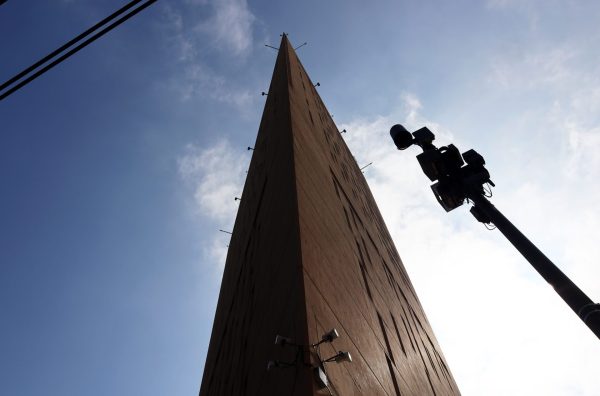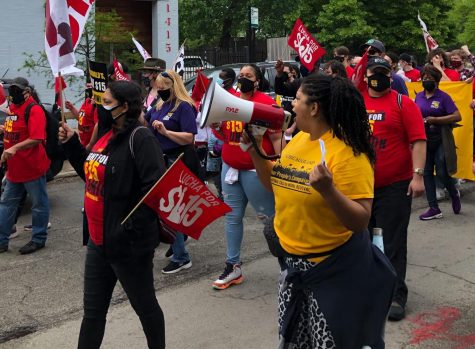Can Chicago support Rodney Reed?
Ricardo Brazziell / Associated Press
In this Oct. 13, 2017, file photo, death row inmate Rodney Reed waves to his family in the Bastrop County District Court in Bastrop, Texas.
Innocent until proven guilty is a well-known phrase in the American legal system. This phrase spearheaded the argument to push back Rodney Reed’s execution date, originally set for Nov. 20.
The Texas Court of Criminal Appeals ruled on Friday, Nov. 5 to stop Reed’s execution on Friday, Nov. 15. According to the New York Times, the court that he was originally tried in has been ordered to consider the new evidence in the case.
Reed, 51, was convicted in the 1996 murder of 19-year-old Stacey Stites. According to the Texas Tribune, he has served time in prison for 21 years. Stites was raped according to prosecutors, murdered by strangulation and her partially clothed body left on the side of a road in Bastrop County, Texas.
According to CNN, Stites left for an early morning shift at a local grocery store. Her fiancé, Jimmy Fennell, claimed that he was still asleep. Her pickup truck was found abandoned in a high school parking lot.
Reed is a black man and Stites was a white woman, preparing to marry a man who was a police officer at the time. There was an all-white jury involved.
Students Against Incarceration (SAI) is an organization at DePaul aiming to educate students about the issues in the U.S. criminal justice system while serving and fighting for the incarcerated population. There are students who work with various organizations that work to reform the prison industrial complex.
Katrina Phidd, a junior studying sociology at DePaul, is the co-president of SAI. She expresses the importance of support from as many people as possible, specifically residents of Texas.
“It’s really easy to execute someone when no one [is] watching,” Phidd said. “But when the whole world is watching, that’s a little more pressure to do the right thing.”
Despite Reed being linked to the DNA found in Stites body, many believe there is evidence pointing to his innocence. The weapon used in Stites’ murder was never tested for DNA evidence with forensic experts admitting to their error, and there are two testimonies of Fennell admitting that he killed her.
Audrey Kerba, a sophomore studying communication and media at DePaul is also a member of SAI. She says that students can also support by donating to Reed’s family, who have “spent decades advocating for his innocence.”
This case has been gaining attention around the country. Celebrities such as Kim Kardashian West, Rihanna, Beyoncé, and others have utilized their social media platforms to speak out in support of Reed. Organizers have traveled to Texas in order to support Reed and his family.
One of those people is Mark Clements, an organizer from the Chicago Torture Justice Center. He was present at the vigil held in front of Gov. Abbott’s mansion in Austin on Thursday night. Clements has been supporting Reed’s case for over 10 years.
“I got involved to bring attention to this case,” Clements said. “I wanted to be one of many that would stand up for him.”
SAI and other people around the country believe that this case is racially charged. And it’s important to note that Reed and Stites were involved in a consensual relationship — according to the Washington Post, witnesses have voiced their knowledge on Reed and Stites’ relationship.
Susan Dumbleton was formerly a professor at DePaul in the School of Continuing and Professional Studies. She talks about how students can help with delaying Reed’s execution.
“They should write to or call the [Texas] governor’s office,” Dumbleton said. “Saying that they are not from the state but they know that the people of Texas do not want to execute an innocent person any more than the citizens of Illinois would, or something like that.”


















Bigmomma • Nov 18, 2019 at 3:57 pm
Her Man failed the Lie detector test
Her Man, her sugar, her soon to be husband, the man who she wanted babies with, failed the lie detector test
and they are still saying Mr. Reed is the Killer without a doubt. I just dont know this is awful and i hope both families can make it through this. terrible
Bigmomma • Nov 18, 2019 at 3:47 pm
NOT ONLY DID HE CATCH A CASE HIMSELF OF SEXUAL ASSAULTING A FEMALE IN HIS CUSTODY
iT SURE GAVE SOME AMUNITION TO THE DEFENSE OF RODNEY. WHO CATCHES A SEXUAL ASSAULT CASE AS A POLICE OFFICER AND A KIDNAPPING CASE, WHO DOES THAT, NOT REAL OFFCIERS THAT STAND TRUE TO SERVE AND PROTECT THE ONES THAT MISUSE THAT BADGE, MAKES IT HARD FOR COMMUNITIES OF ALL RACES TO RUST THEIR INTEGRITY AND AUTHORITY.
THE KILLER OR KILLERS MAY NEVER GET CAUGHT AND IF THEY DO SUCH AS SO MANY OTHER CASES THE STATUE OF LIMITATIONS CAN RUN OUT, EXCEPT ON A FEW RAPE CASES ON CHILDREN. ljUST TEST THE FREAKIN DNA, IT MAY SHOCK BOTH FAMILIES.
Bigmomma • Nov 18, 2019 at 3:35 pm
Last but not least the lie detector test
Come on he failed the LIE DETECTOR TEST
WHO FAILES A LIE DETECTOR TEST A LOVING HUSBAND WHO IS READY TO SETLE DOWN AND GET MARRIED TO THE WOMAN HE LOVES
DOES NOT FAIL THE DAM LIE DETECTOR TEST
HES CALM AND CONFIDENT THAT HE HAD NOTHING TO DO WITH HER MURDER AND THAT WAS NOT DONE
YES THERE IS EVIDENCE AGAINST RODNEY BUT THERE IS EVIDENCE THAT POINTS TO OTHERS AS WELL, WE JUST DONT KNOW WHO YET
IF U LOVED AND CARED ABOUT THIS WOMAN STACY THAT WAS BRUTALLY BEAT AND MURDERED U WOULD WANT THE TRUTH AND U WOULDNT STOP FIGHTING TIL U GOT IT.
AND NOT A DAM LIE THAT WOULD HAVE WENT TO BOTH OF THEIR GRAVES.
Bigmomma • Nov 18, 2019 at 3:26 pm
Wow that is a lot of information to process and it sounds like he’s guilty. Wow, but you forgot to add somethings that seems to be most important in deciding life or death. Holes in the case.
One of those holes was the vehicle that had body fluid all in andl over it and it was never tested for his Rodneys DNA, DNA was found in her body and on her breasts. The Murder weapon was never tested for DNA, why not. The Beer cans were found at the scene were DNA from close friends of her fiances who were fellow officers and one later committed suicide..
Look there are many cases of officers killing their wives girlfriends and getting away with murder and botching up investigations and lying, so why wouldn’t a court want all the DNA testing what are they trying to hide an who are they trying to protect?
So the opinions of anyone who displays anger towards a group of people to expose injustice is evil. The DNA linking to the murder should be included not only the DNA in the body. May be when they test the murder weapon it might be someone else but I would like to know and so would Kim Kardashian and other people great and small would like to know why these racist practices and injustices are still in our society and incriminated black men to the point of taking their lives without fully having all the evidence that proves their guilt without a reasonable doublt.
Hate!!!, it broke the hearts of those not to see another black man lynched and strapped to a gurney and/or hanging from a tree.
Ok, he had problems with women hes 6 foot 2 and looks half way decent and white women love a black man with a big package who can do what little scrutiny white men cant and yes they will cheat and get married the next day, so hey Im not saying that’s what she did.Im saying it is not uncommon for a black man to have that problem because of the size of his penis, white women are fascinated with and white men hate it. I hate what happened to her and its sad. African American men always get the bad rap of being rapist, and violent and sentenced 10 times more than other races.. Yes he had baby momma drama and other failed relationships that resulted in issues but that does not mean he is the killer of Stacey. It has to be proven without a reasonable doubt and that is what it has not done. As far as the Death Penalty Organization being frauds that’s a whole nother topic and really does not even relate to this case.
Its do taboo and ugly the courts had to stop this cause its so systematic it usto be that when a black man raped a white women he was immediately Lynched and hung by a all white jury.
In the case of Mr. Reed he had a all white jury and was scheduled to by lynched November 20, 2019 and it was stopped and people are mad. That’s Crazy evil. Get to the bottom of this and find out whos prints are on that murder weapon
I stand with the truth. Lets fill those holes and see what really happened, whos belt was that? Whos TShirt was that? This is clearly an awful awful case and heart felt for the stites family the mother, both mothers to Rodney and stacy The nation intervened, Dr. Phil, Opraha, Rihana, Kim Kardashian, but how could the justice system allow this injustice in the courts. They never thought they would convict stacy Petersons killer
Dudley Sharp • Nov 18, 2019 at 11:45 am
Robert Reed, Some Context
Read the many cases of sexual assault by Reed (1), inclusive of a 12 year old, raped orally, vaginally and anally, with Reed’s DNA confirmed.
Judicial review of Reed’s claims of 1) innocence and 2) the state not disclosing evidence: ” . . . we hold that Reed has failed to show that the State did not disclose favorable evidence. . . . Reed has not made a threshold, prima facie showing of innocence by a preponderance of the evidence . . . We deny relief.” (2)
The Innocence Project can be, very, deceptive, as detailed (3), inclusive of creating false confessions and claiming a death row DNA exoneration, when not true, by judicial review, and the IP not revealing that, for 8 years and counting.
Innocent frauds, by anti death penalty activists, are the rule, not the exception (4), with a 77% error rate in innocent/exoneration claims (4).
Massive, worldwide activism, with actors and other anti death penalty activists, claiming the “innocence” of death row inmates have been, intentionally, fraudulent and/or , otherwise, wrong (5), very often, by the media, as well, and as detailed (5).
Appellate judges and governors are very generous with death row inmates, with only 15% being executed and 45% removed by appeals/commutation
What will happen with Reed? As so many have not figured out, yet (5), pay attention to the courts, not the activists.
1) II. THE STATE’S PUNISHMENT CASE, pages 7, 8 and 9,
IN THE Supreme Court of the United States
RODNEY REED, Petitioner, vs. THE STATE OF TEXAS Respondent, No. 17-1093
https://www.supremecourt.gov/DocketPDF/17/17-1093/45899/20180507150103836_Reed%20BIO%20FINAL.pdf
2) V. Conclusion, within EX PARTE RODNEY REED, Applicant ON APPLICATION FOR A WRIT OF HABEAS CORPUS, IN THE COURT OF CRIMINAL APPEALS OF TEXAS, NO. AP-75,693 IN CAUSE NUMBER 8701 IN THE 21ST DISTRICT COURT OF BASTROP COUNTY
https://law.justia.com/cases/texas/court-of-criminal-appeals/2008/17748.html
3) see paragraphs 3 and 4
Death Row, “Exonerations”, Media & Intentional Fraud
https://prodpinnc.blogspot.com/2019/06/death-row-exonerations-intentional-fraud.html
4) Deception: The DPIC “Exonerated”/”Innocence” List
http://prodpinnc.blogspot.com/2019/09/deception-dpic-exoneratedinnocence-list.html
and
Death Row, “Exonerations”, Media & Intentional Fraud
https://prodpinnc.blogspot.com/2019/06/death-row-exonerations-intentional-fraud.html
5) Just a few
HOLLYWOOD, MURDER AND TEXAS
DEATH ROW INMATE GARY GRAHAM AND THE ANTI-DEATH PENALTY MOVEMENT:
A CASE STUDY OF LIES, HALF-TRUTHS AND INTIMIDATION
http://prodpinnc.blogspot.com/2019/11/gary-graham-hollywood-murder-and-texas.html
Rebuttal: “Trial by Fire: Did Texas execute an innocent man?”, David Grann, The New Yorker, 9/7/2009: Cameron Todd Willingham: Media meltdown & the death penalty
# 11 here
https://prodpinnc.blogspot.com/2013/04/the-innocent-frauds-standard-anti-death.html
“Troy Davis & The Innocent Frauds of the anti death penalty lobby”,
http://prodpinnc.blogspot.com/2011/11/troy-davis-innocent-frauds-of-anti.html
Guilty: Sacco and Vanzetti
http://prodpinnc.blogspot.com/2013/08/guilty-sacco-and-vanzetti.html
Roger Keith Coleman #2, here
https://prodpinnc.blogspot.com/2013/04/the-innocent-frauds-standard-anti-death.html
so many more
Overview
Death Row, “Exonerations”, Media & Intentional Fraud
https://prodpinnc.blogspot.com/2019/06/death-row-exonerations-intentional-fraud.html
The Innocent Frauds: Standard Anti Death Penalty Deception
https://prodpinnc.blogspot.com/2013/04/the-innocent-frauds-standard-anti-death.html